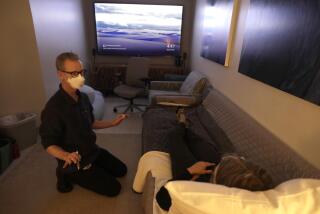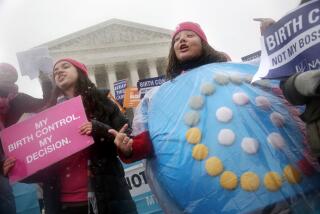A Silicone Implant Gets Panelâs OK
WASHINGTON â A day after rejecting another companyâs proposal, a Food and Drug Administration advisory panel recommended Wednesday that silicone breast implants made by Mentor Corp. be approved for use in cosmetic surgery.
The 7-2 vote came with nine stipulations attached, including ongoing safety monitoring studies, required follow-up care of patients, special training for surgeons and voluntary tracking of every woman with implants.
But the expert advisors gave a mixed message to the FDA regulators who must make the final decision on marketing the implants: The same panel voted 5-4 on Tuesday to recommend ânon-approvalâ of silicone implants made by another manufacturer, Inamed Corp.
Many observers consider the risks and benefits of the two companiesâ products to be similar. Both Mentor and Inamed are located in Santa Barbara.
âIt was a bizarre and strange decision by a handful of panel members who switched their votes, who [Tuesday] demanded longer-term data and [Wednesday] accepted shorter-term data,â said Dan Cohen, Inamed vice president.
Mentor provided two to three years of data on implant ruptures, and Inamed offered three to four years of information from clinical trials.
But Joshua H. Levine, Mentorâs chief executive, said the vote showed that âthese products are not all created equal.â He said he was gratified by the decision, but recognized that âthere are still other hurdles to be passedâ before his company can offer its implants to women seeking surgery to enhance the shape of their breasts.
âThis is a great day for my patients, who will now have access to a better and safer product,â said Dr. Scot Glasberg, a New York plastic surgeon and Mentor consultant. âThere is no mixed message here. [Inamedâs] presentation had problems.â
The two companies now divide the $400-million-a-year U.S. breast implant market. Mentorâs shares rose 77 cents Wednesday to close at $35.33 on the New York Stock Exchange. In after-hours trading, they rose as high as $39.60. By contrast, Inamed shares fell $2.90 on Nasdaq, closing at $63.51, and dropped to $60.80 after-hours.
The FDA had no immediate comment on the panelâs recommendations. The time frame on the agencyâs decision to agree or disagree with its advisory panelâs recommendations ranges from six weeks to several months.
More than 250,000 American women have cosmetic breast surgery every year, but for the last 13 years the FDA has allowed only implants filled with a saline solution.
The FDA ordered the silicone devices off the market in 1992 over concerns about health problems possibly caused by ruptured or leaking implants. Since then, silicone implants have been used only for women having breast reconstruction after cancer surgery or for those who agreed to participate in strictly controlled clinical trials.
Although studies have found no link between silicone implants and cancer or other serious illnesses, many women have other complications, including painful contracture of the breasts, scarring and rupture of the implants. There remains a lingering suspicion that, in a small group of women, silicone can prompt chronic fatigue symptoms.
Nonetheless, silicone implants are considered more natural in appearance and feel than saline-filled ones. In European countries, where they are widely available, they are the choice of 90% of patients who undergo cosmetic surgery.
Three of the panelâs nine voting members supported Mentorâs proposal after rejecting Inamedâs. They were Barbara Manno, a professor of psychiatry at Louisiana State University; Dr. Joseph LoCicero, chairman of surgery at the University of South Alabama; and Stephen Li, president of a Sarasota, Fla., medical devices company.
Li said he voted to approve the Mentor application because âthey are two different devices.â He said he was impressed by Mentorâs failure rate of 1.4% and by a mechanical testing program the company had designed for its implants.
âThey say they can last 61 years,â Li said. âI donât believe that, but even if they are off by a factor of four, thatâs still 15 years.â He also praised Mentorâs presentation before the panel, describing it as informative and responsive to the panelâs concerns.
Indeed, Mentor appeared to have studied Inamedâs elaborate presentation and decided to put forward a low-key alternative.
However, an FDA staff analysis of data from Mentorâs clinical trials concluded that much of the information was of âlimited valueâ in predicting whether implants would break after more than a few years in a womanâs body. The company recommends replacement of ruptured implants, meaning that women may have to undergo repeated surgery.
Panel member Dr. Amy E. Newburger, a Scarsdale, N.Y., dermatologist who voted against both companiesâ products, said she simply did not have enough information to dispel doubts about their long-term safety.
âI donât understand why this was presented now,â said Newburger, noting that the two companiesâ clinical trials were designed to last 10 years.
By a 7-2 vote, the panel rejected a proposal for a special study on women who have symptoms indicating a reaction to silicone.
Opponents of silicone implants, while disappointed by Wednesdayâs action, predicted that the FDA would have a difficult time approving either product, given the conflicting votes.
âOverall, there was a mixed message here, and it is confusing,â said Diana Zuckerman, president of the National Research Center for Women and Families. âThis will make it hard for the FDA.â
Regulators also might come to regard all the conditions attached to the Mentor approval as a less-than-resounding endorsement, she said -- a yellow light, not a green.
Less than two years ago, a previous FDA panel recommended approval of Inamed implants. But the agency decided not to follow the recommendation, opting to ask for more data.
More to Read
Inside the business of entertainment
The Wide Shot brings you news, analysis and insights on everything from streaming wars to production â and what it all means for the future.
You may occasionally receive promotional content from the Los Angeles Times.










